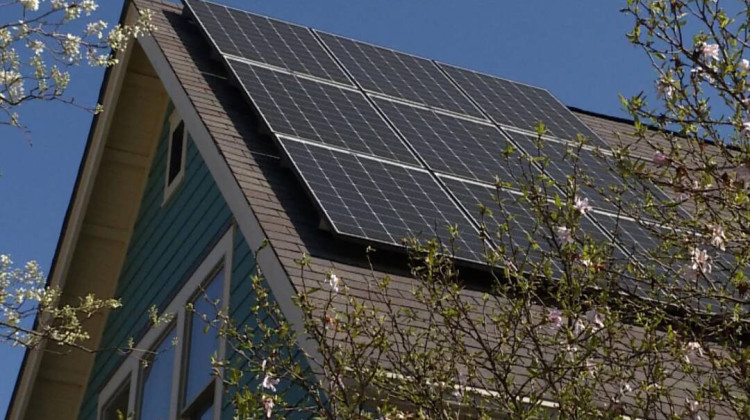Listen to a radio version of this story
The Indiana Court of Appeals said CenterPoint isn’t doing the right math when it comes to paying people with solar panels for the excess energy they deliver to the grid. The case could have big implications for other large utilities in Indiana.
Right now, electric utilities subtract how much energy someone with solar panels uses from how much they produce for the grid over a whole month. But the state approved CenterPoint’s request to look at that difference almost in real time — only giving solar customers credits for those moments where they produce more energy than they use.
The court said Indiana’s net metering law doesn’t mention this way of calculating excess energy and CenterPoint should go back to calculating it monthly.

Laura Ann Arnold is the president of the Indiana Distributed Energy Alliance also known as Indiana DG — one of seven groups that challenged the state's decision. She said using so-called "instantaneous netting" would have provided less return on investment for people with solar panels.
Arnold said a lot is riding on this court case — the state has approved similar net metering tariffs for three other investor-owned utilities and is currently reviewing Duke Energy’s.
“But we feel jubilant at this first step with the court, that they are ruling in our favor," Arnold said.
Join the conversation and sign up for the Indiana Two-Way. Text "Indiana" to 73224. Your comments and questions in response to our weekly text help us find the answers you need on statewide issues.
Anthony Swinger is spokesperson for the Indiana Office of Utility Consumer Counselor. He said the agency is glad to see the court enforced Indiana’s net metering law.
The case has been kicked back to the Indiana Utility Regulatory Commission. Swinger said it’s not clear what that means for CenterPoint’s customers or the four other investor-owned utilities who requested net metering tariffs.
“I think we'll know more in the next couple of weeks. But at this point, it puts the ball in the commission’s court and we will see what happens," he said.
In an email statement, CenterPoint said it was reviewing the court’s decision and weighing its options:
"CenterPoint Energy’s [proposed way of reimbursing solar customers for excess energy] replaced a payment structure that resulted in customers without their own generation subsidizing customers with generation, even though all customers continue to depend on CenterPoint Energy’s infrastructure. We will work toward and are in support of an option that is fair for all of our customers."
Investor-owned utility customers who install solar panels after July 1, 2022 will no longer be able to get the higher, retail rate for excess energy they deliver to the grid.
Contact reporter Rebecca at rthiele@iu.edu or follow her on Twitter at @beckythiele.
Indiana Environmental reporting is supported by the Environmental Resilience Institute, an Indiana University Grand Challenge project developing Indiana-specific projections and informed responses to problems of environmental change.
9(MDAyMzk1MzA4MDE2MjY3OTY1MjM5ZDJjYQ000))
 DONATE
DONATE







 Support WFYI. We can't do it without you.
Support WFYI. We can't do it without you.